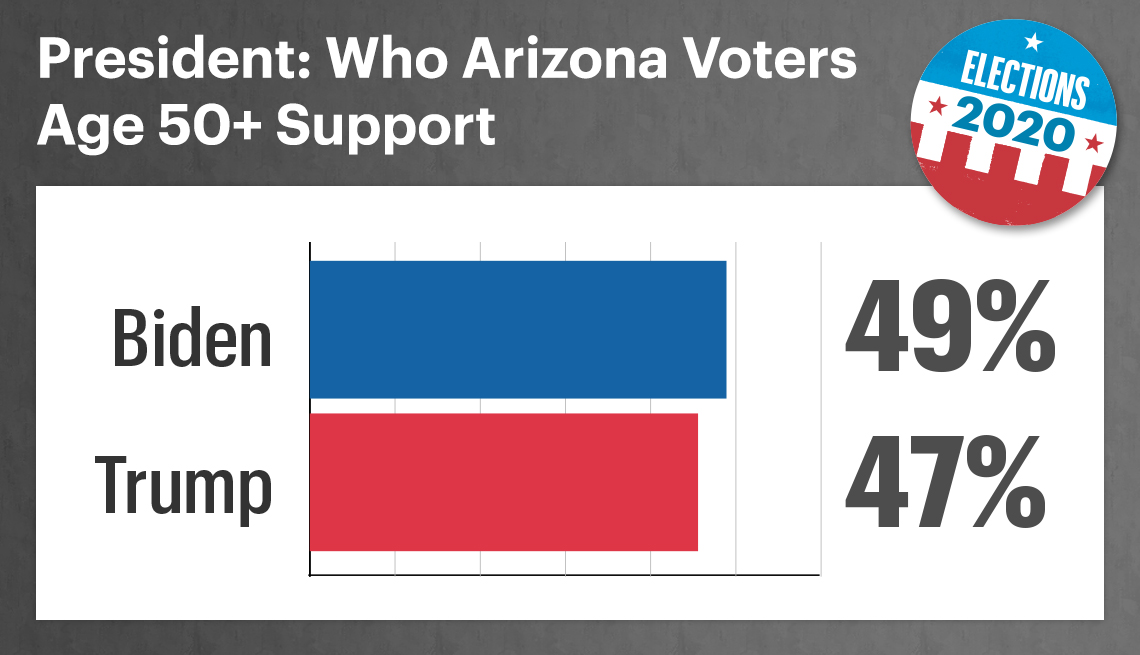AARP Hearing Center

En español | More than half (54 percent) of Arizona voters age 50 and older are worried about getting the coronavirus, and almost half (47 percent) are concerned they won’t be able to afford the health care that they or their family need, according to a new AARP poll that finds older voters could decide the 2020 elections.
The poll also shows that 90 percent of older Arizonans are more likely to vote for candidates who support protecting Social Security from benefit cuts and that 88 percent are more likely to favor candidates who support strengthening Medicare.
These results show that, despite the strong partisan divisions in the country, “there are some foundational programs that cut across these divisions — notably Social Security and Medicare,” says John Hishta, AARP senior vice president for campaigns. “These are areas that 50-plus voters care deeply about, no matter where they stand. And it shows that the candidates should be addressing those issues with these voters.”
The full results of the public opinion survey, released Tuesday, also found that 90 percent of those polled are worried that Congress won’t deal with the problems they face and 90 percent are also concerned that America is becoming even more divided.
Other key findings in the poll:
- 72 percent of 50-plus Arizona voters are worried there will be cuts to Social Security to pay for new spending and the budget crisis.
- 88 percent say they would be more likely to vote for a candidate who supports allowing Medicare to negotiate with drug companies for lower prices.
- 82 percent will support candidates who favor increasing protections on nursing home residents during the coronavirus pandemic.
- 82 percent also favor elected officials who will support making available quality, affordable long-term care options, including for home care and nursing homes.
In the presidential race, Vice President Joe Biden and President Donald Trump are locked in a statistical dead heat among likely Arizona voters, according to the survey, which also shows that Democrat Mark Kelly has a slim lead over Republican Sen. Martha McSally in a pivotal U.S. Senate race.
Arizona is among a group of competitive battleground states where the results of the presidential race could decide the November election. The survey shows that Biden leads Trump 48 percent to 47 percent among all likely voters and that the former vice president also leads the president 49 percent to 47 percent among likely voters age 50 and older.
“We believe 50-plus voters are going to play a critical role in this year’s election,” said Nancy LeaMond, AARP’s executive vice president and chief advocacy and engagement officer. She pointed out that while Americans age 50 and over comprise 45 percent of the voting population, they accounted for 56 percent of the ballots cast in 2016. “They punch above their weight,” she added.
In the U.S. Senate race, Kelly, a former NASA astronaut, is facing McSally, who was appointed in 2019 to fill the term of the late Sen. John McCain. Kelly leads McSally 48 percent to 45 percent among all Arizona likely voters, and he leads 50 percent to 46 percent among 50-plus voters. This race could impact whether Republicans retain control of the U.S. Senate or Democrats take the majority.
The AARP survey also found that voters 50-plus are split over whether they support the way Trump has managed the coronavirus pandemic. Among all older voters 48 percent support his handling of the crisis while 52 percent oppose it.
In addition, half of Arizona’s 50-plus electorate say they would get a COVID-19 vaccine, but a quarter of all respondents say they weren’t sure if they would get it.
The survey also found that the vast majority of Arizonans (75 percent) will cast their ballot either by mail or by voting early in person. Only 22 percent said they will go to a polling place on Election Day.
AARP’s Protect Voters 50+ campaign is designed to help make sure that even as America continues to deal with the coronavirus crisis, that all voters get the information they need to safely cast their ballot. AARP is working in every state to educate older voters on voting options.
“One thing we know is that virtually all older voters plan to vote this year,” said LeaMond. “They want to vote; they want their voices heard and they’re going to find a way to do that that’s safe,” she said.
AARP commissioned Benenson Strategy Group and GS Strategy Group to conduct telephone surveys in six presidential battleground states, including Arizona. The pollsters interviewed 1,600 likely Arizona voters between Aug. 28 and Sept. 8. The results have a margin of error of plus or minus 2.5 percent.
Also of Interest
































































